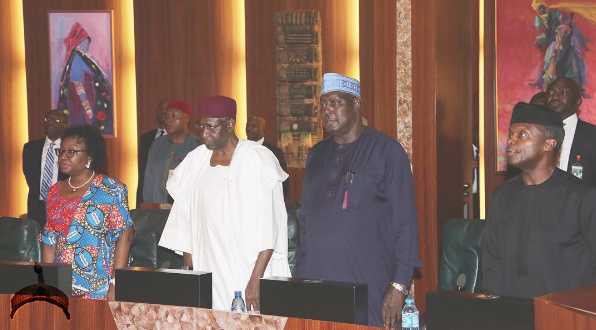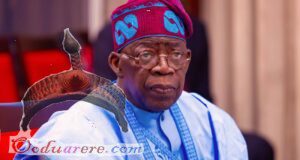As the President of the Federal Republic of Nigeria, President Muhammadu Buhari marked one-year in office on May 29, 2016, so is the Senate of the Federal Republic of Nigeria marking her one-year anniversary as the 8th Senate today being the 9th of June, 2016.
Amidst all the happenings in Nigeria for the past 365 Days; ranging from Economic imbalance, challenges of insecurity, free fall of the Naira, PMS subsidy removal, food scarcity, inadequate power supply etc, the 8th Senate under the leadership of Senate President, Bukola Saraki has kept a stronghold of the Legislation by enacting useful laws (through timely bill passage and timely motion consideration) to improve the lives and living condition of Nigerians.
Listed below are a few of the important achievements of the 8th Senate in the last one year.
1. Bills
The Senate currently has over 167 Bills that have passed first reading (the introductory stage), over 39 in second reading stage and more than 6 bills are in third reading: these bills will be thoroughly scrutinised and further debated at the 3rd reading by members of the upper and lower chambers of the National Assembly. Once Mr. President assents to the bills, it then becomes law. A few of these key Bills include:
a. Commercial Agriculture and credit guaranty scheme bill: this bill which has passed third reading will provide adequate credit facilities for Nigerians willing to invest in Agriculture especially the young Nigerians.
b. The Petroleum Industry and Governance Bill, (PIB) has also been introduced in less than one year; the petroleum industry and governance bill has remained controversial such that it failed to pass in the last two assemblies. The PIB if passed in the 8th senate will overhaul the petroleum industry and bring sanity to the downstream sector. It will also mark a watershed in Nigeria’s economic history.
c. Prohibition of Sexual Harassment of Student by Educators in Tertiary institutions Bill: This bill when passed seeks to mete out strict punishment to lecturers, teachers, young girls and boys who engage in sexual harassment especially in the tertiary institutions.
d. Establishment of the office of the federal and state independent prosecution bill: this bill when passed into law will ensure that cases of corruption by federal or state government of Nigeria are persecuted with credibility through an independent prosecutor who will have no affiliation with the government.
e. Bankruptcy and Insolvency Act Repeal and Re-enactment law: This law will attract more investments into Nigeria and provide a fair and orderly process for dealing with the financial affairs of both, insolvent individuals and companies.
f. Establishment of the National Transport omission as an independent Multi-Modal Economic Regulator for Industry Transport bill: This bill when passed into law will meet the challenges in the transportation industry and create a sound system that will match a robust economy.
g. On-going consideration of the amendment to the Public Procurement Act. The Amendment of public procurement act will give priority to locally made products; the amendment bill has successfully passed second reading and is now awaiting third reading.
h. #JAMBBill: the Bill for an act to amend the JAMB Act passed Second Reading. When finally amended, this piece of legislation will ensure that the JAMB results of students will be valid for up to 3 years — as opposed to the current 1 year validity period. This is due to the fact that hundreds of thousands of candidates that sit for JAMB exams and do not secure their admission into higher institutions in the same year have to sit for the same exam the next year which is not the best. Hopefully, this amendment will go a long way in reducing the financial constraints on parents, and the psychological burdens on students who have secured pass marks but are unable to gain admission in the same year.
i. Also, the 8th Senate has identified 30 Priority Bills that will drastically improve the Nation’s economy.
2. Petitions
The Committee on Ethics, Privileges and Public Petitions which is evidently one of the most active Committees in the 8th Senate Chaired by Senator Samuel Nnaemeka Anyanwu has received over 125 Petitions presented to the Senate; 32 of such petitions are already concluded while 82 is still under consideration. These petitions are sent in from Nigerians through their various representatives in the Senate appealing to the senate to aid their predicament ranging from unlawful termination of appointment, ill treatment, rights violation, etc.
3. Motions
So far, over 162 motions have been considered and resolutions of top benefits to Nigerians passed. Some of these motions include:
a. A motion that led the Senate to investigating and exposing abuse of import duty waivers on rice.
b. The 8th Day of March 2016 marked the International Women’s Day with this year’s theme: #PledgeforParity.
In commemoration of this day, the Nigerian Senate through the Chairman Senate Committee on Women Affairs, Senator Oluremi Tinubu representing Lagos Central presented a Motion on Gender Equality and fair treatment among women in Nigeria. The Motion was co-sponsored by the Vice-Chairman Senator Stella Oduah and other members of the Committee.
c. Motion on the ‘Construction of Dams to Remedy the Perennial Flood Disasters in Nigeria’ by Senator Stella Oduah (Anambra North)
d. Motion on the ‘Excessive Tuition Fee Charged by the Nigerian Law School,’ by Senator Shehu Sani (Kaduna Central)
4. Treasury Single Account (TSA)
The Senate through Senator Dino Melaye of Kogi West detected fraudulent activities involved in the implementation of Treasury Single Account Policy. The resolutions of the Senate brought the act to a halt saving Nigeria N20 Billion.
5. NERC
The Senate successfully used its oversight function to abolish the practice of bulk billing of consumers. In a motion brought to the floor by Senator Sam Egwu, the Senate put pressure on the Nigerian Electricity Regulatory Commission (NERC) to explain the basis of Distribution Companies (DISCOs) estimating the electricity billing of customers, while still making payments for meter installation in their homes.
In line with this motion, NERC, at a press briefing in Abujaon Monday 17, 2015, agreed with the Senate and said that consumers who do not receive power supply will henceforth be exempted from paying the fixed charges; adding that power distribution companies have come into consensus to review the fixed charge policy. Furthermore, to ensure more accountability due to the Senate’s query, NERC released a report stating that it supports the Senate’s decision to investigate the various projects and funding in the power sector since 1999.
6. Oversight on PMS Crisis
As Nigerians continued to groan under fuel scarcity, the Senate summoned the Minister of State for Petroleum Resources, Ibe Kachickwu, to appear before it for explanation on what he is doing to end the rising scarcity in the country.
The Senate Committee on Petroleum Resources (Downstream) chaired by Senator Jibrin Barau (Kano North), issued the summon to the Minister after carrying out on the spot assessment of the crisis in major filling stations within Abuja metropolis.
The Senate gave the federal government a marching order to end the fuel crisis. Since then, the government has taken drastic step to cut the bureaucratic loopholes that hinder the importation and distribution of fuel.
The fuel stations visited by the Senate Committee, included: Forte Oil, opposite Transcorp Hilton in Maitama District, Abuja, Oando Filling station, Zone 4, Abuja, Total Fuel Station in Asokoro District.
7. #BuyNaijaToGrowTheNaira
The Senate led by Senate President Bukola Saraki championed the promotion of Made in Nigeria goods with the hashtag: #BuyNaijaToGrowTheNaira that trended on Social Media thanks to the Common Sense Senator Ben Murray-Bruce. Another Senator who contributed greatly to the campaign was Senator Enyinnaya Abaribe who organized a Made in Aba trade fair that has the Senate President in attendance, members of the Senate Leadership and the general public. Traders from all over the country especially those from Aba in Abia State displayed various products of Nigeria Origin.
Also, the owner of Innoson Motors; an automobile company that produces Made in Nigeria cars was invited to the Senate for briefing and support as the Senate President, Senator Ben Murray-Brue, Senator Stella Oduah and other senators patronized the vehicles.
8. National Assembly Business Roundtable #NASSBER
The #NASSBER which was held at the New Senate Building of the National Assembly on the 21st of March 2016 had lots of stakeholders from different sectors present and a couple other facilitators who anchored most of the segments scheduled for that day.
The round table focused on a total of Eleven (11) key sectors and important areas of the nation’s economy. These areas included: Competition, Doing Business, Roads Infrastructure, Rail Infrastructure, Maritime Infrastructure, Public-Private Partnership, Taxation, Finance and Investment, Arbitration and Dispute Resolution and e-Business and Intellectual Property.
All resolutions made by each hearing were submitted to the Nigerian Senate for further deliberations.
9. Passage of #Budget2016
Despite the lapses and controversy that trailed the budget, the Senate on Wednesday, March 23, passed the 2016 budget in time as promised. The 2016 Budget of N6,060,677,358,277 submitted by President Muhammadu Buhari was reduced by N17,002,641,773.
The Senate debated the bill on January 20, 21, 26 and 27 respectively. The bill was read a second time on January 27, and consequently referred to the committee on appropriations for further legislative actions.
While preparing details of the bill, the appropriation committee adopted a benchmark price of 38 US Dollars per barrel on crude oil based on the Medium Term Expenditure framework (MTEF) and Fiscal Strategy Paper (FSP). Crude oil production was bench marked at 2.2 million barrels per day with an exchange rate of 197 Naira to one US Dollar adopted.
Thereafter, the highlight of the bill as recommended by the committee was an aggregate expenditure of 6.06 Trillion Naira. Public hearing on Frivolous petition bill: The senate through a public hearing on this bill deduced the stand on Nigerians who vehemently opposed the bill on grounds that it will gag the use of social media.
10. Creation of North East Development Commission (NEDC)
The Senate organised a 2-day Public Hearing on a Bill for an Act to Establish the North East Development Commission (SB. 163) to address the devastation caused by insurgency and other matters connected.
The joint Senate Committee on Special Duties and the Senate Committee on Establishment and Public Service which is Chaired by Senator Abdul-Aziz Murtala Nyako (Adamawa entertained suggestions and contributions from stakeholders who represent those that will directly benefit from the Commission when created.
The North East Development Commission which will be the manifestation of the Act seeks to address the problems of the North East Zone (NEZ), collaborate with all relevant stakeholders to stop insurgency in the Zone, coordinate activities that would stop the incubation of terrorism within the Zone and stabilize the NEZ by stopping the displacement and involuntary movement of people out of the Zone to other parts of Nigeria and bordering countries.
11. Bankruptcy and Insolvency Law
The Bankruptcy and Insolvency Act, (Repeal & Re-enactment) Bill, 2016, which is one of the priority bills of the 8th Senate that passed third reading on 26th of May, 2016 will play an important role as a key contributor to better credit risk management and also as a vital credit availability and business management tool.
The passing into law of the Bankruptcy and Insolvency Act would mean for free exit to be orderly in the event of losses, Nigeria needs stronger bankruptcy and insolvency laws to guide the process that would ensure that such firms that incur losses can easily break even and exit the markets using several market tools and intervention mechanisms.
12. Visit to Nigeria by the South African President, Jacob Zuma
It was a full house in the Green Chamber of the National Assembly, when the South African President, Jacob Zuma accompanied by President Muhammadu Buhari visited.
Zuma advocated for a lasting partnership between the countries while also noting that such partnership should not be limited to strengthening of bilateral relations alone, but also to partner together in pursuit of the continental integration, peace, security and development.
The visit of President Jacob Zuma to the National Assembly was symbolic and historic on many levels.
The 8th Senate before its first 100 Days made a lot of promises to Nigerians which included #OpenNass. So far, the 8th senate has fulfilled the promise of having a transparent National Assembly by opening up most of its activities to the general public to a reasonable extent. This is to enable the public understand legislative process and the activities of the National Assembly.
Through #OpenNass, the Senate has been able to respond and attend to a lot of issues affecting Nigerians. Some of which includes; Senate intervention which led to the reviewing of Central Bank of Nigeria Policy to enable small business owner gain access to Forex and the 8th senate has unveiled plans to set up Transparency and Anti-corruption Commission to further ensure eradication of corrupt practices in Nigeria.
The Senate President on the other hand has been responsive to public concerns, he has also charged Nigerians to ask their respective representatives within the Senate and the House of Reps on the constituency programs they have planned for them and also make use of the available platforms created by the 8th Senate to reach out to their representatives in the Senate and follow up on such projects.
Abang Dove writes from Abuja, she tweets with @abangdove
 Ọmọ Oòduà Naija Gist | News From Nigeria | Entertainment gist Nigeria|Networking|News.. Visit for Nigeria breaking news , Nigerian Movies , Naija music , Jobs In Nigeria , Naija News , Nollywood, Gist and more
Ọmọ Oòduà Naija Gist | News From Nigeria | Entertainment gist Nigeria|Networking|News.. Visit for Nigeria breaking news , Nigerian Movies , Naija music , Jobs In Nigeria , Naija News , Nollywood, Gist and more









